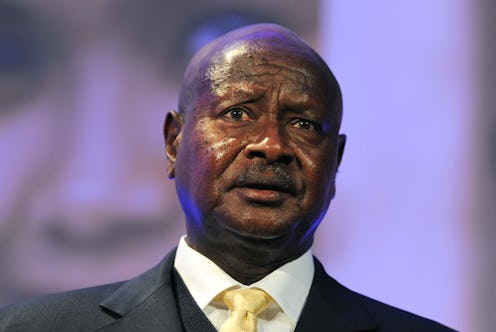News
Uganda Just Struck Down Its Anti-Gay Law
The Uganda Anti-Homosexuality Act — formerly known as the "Kill the Gays Bill," thanks to its initial death penalty clause — was subject to even more dispute this week. On Friday, a Ugandan court invalidated the anti-gay law, prompting cheers from the activists who have been contesting the bill since Uganda President Yoweri Museveni signed it into law in February. But many caution that celebrations could be premature, as the future for gay rights (or lack thereof) in Uganda remains unclear.
Under the anti-gay law, Ugandans could be sentenced to life in prison for engaging in same-sex relations, jailed for promoting homosexuality, and are legally obligated to report gay people to authorities. Because of the severity of the provisions, it has been widely criticized as inhumane, and the U.S. has even cut funding to Uganda's government because of it.
Gay rights activists have been fighting to overturn the bill — if not based on reforming the perception of homosexuality in Uganda, then due to its technical violations. Before the court's decision, 10 petitioners, including two Ugandan rights organizations, had made several arguments against the bill. They pointed out that, firstly, the bill was passed illegally in parliament because the vote lacked a proper quorum, and secondly, the law violates the people's constitutional right to privacy and dignity, in addition to the right to be free from discrimination and cruel, inhuman, and degrading treatment.
The first point was what overturned the bill.
Why the Bill Was Invalidated
On Friday, a panel of five judges on Uganda's Constitutional Court officially ruled that the anti-gay law was null and void because it lacked a quorum, the minimum number of lawmakers required to be present, during voting. Despite at least three objections, including from the country's Prime Minister Amama Mbabazi, to the lack of a quorum, the speaker of parliament illegally allowed a vote on the measure last December, which resulted in the bill being passed.
"The speaker was obliged to ensure that there was a quorum," the court stated in its ruling, according to the Associated Press. "We come to the conclusion that she acted illegally."
What This Means For Gay Rights in Uganda
Despite the activists' attempt to call into discussion the significant rights violation issues related to the anti-gay law, it seems, for now, the court is solely considering the legality of the bill's passing. In fact, the court has decided to dispose of the activists' petition because the law had been illegally passed in the first place. Talk about a frustrating catch-22.
"We're very happy," Sylvia Tamale, a Ugandan law professor and gay rights supporter, told the New York Times. "But it's unfortunate that the court did not deal with the substantive issues that violate our rights."
Nicholas Opiyo, a Ugandan lawyer and one of the petitioners, agreed, telling the AP, "The ideal situation would have been to deal with the other issues of the law, to sort out this thing once and for all."
While the law has been invalidated for now, some speculate that the state could appeal the decision and legislators could introduce new anti-gay measures in retaliation.
